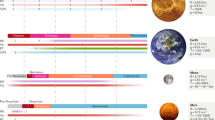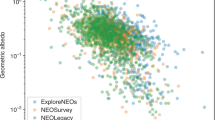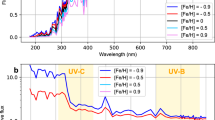Abstract
A comparison of the Earth with the Moon and other planets can help considerably in the solving of geophysical problems. Professor Cook deals with some of these problems in this article, which is a summary of the inaugural lecture he gave as professor of geophysics at Edinburgh on January 15.
This is a preview of subscription content, access via your institution
Access options
Subscribe to this journal
Receive 51 print issues and online access
$199.00 per year
only $3.90 per issue
Buy this article
- Purchase on Springer Link
- Instant access to full article PDF
Prices may be subject to local taxes which are calculated during checkout
Similar content being viewed by others
References
IAU Symp.No. 21, Le Système des Constantes Astronomiques (Gauthier Villars, Paris, 1965).
Lyttelton, R. A., Mon. Not. Roy. Astron. Soc., 129, 21 (1965).
Nature, 223, 321 (1969).
Price, A. T., The Earth's Mantle (edit. by Gaskell, T. F.), ch. 7 (Academic Press, 1967).
Ness, N. F., The Electrical Conductivity and Internal Temperature of the Moon, NASA reprint of papers presented at thirteenth COSPAR Meeting, May 1969.
Sci. Amer., 221, 54 (1969).
Author information
Authors and Affiliations
Rights and permissions
About this article
Cite this article
COOk, A. The Earth as a Planet. Nature 226, 18–20 (1970). https://doi.org/10.1038/226018a0
Issue Date:
DOI: https://doi.org/10.1038/226018a0
Comments
By submitting a comment you agree to abide by our Terms and Community Guidelines. If you find something abusive or that does not comply with our terms or guidelines please flag it as inappropriate.



